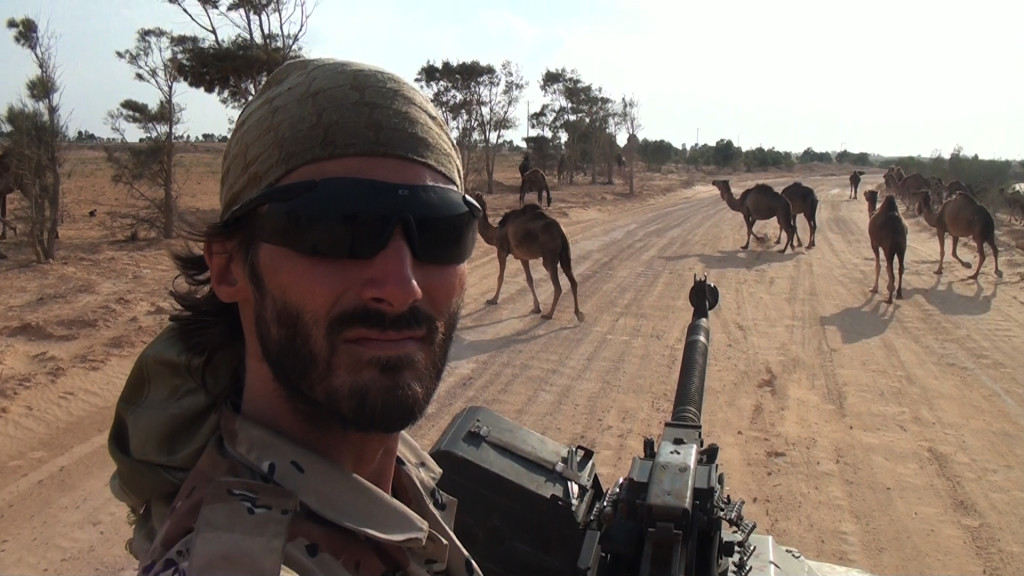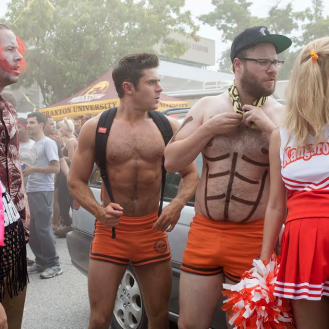By: Gesilayefa Azorbo
The first question Point and Shoot director Marshall Curry asks his subject off-camera is, “So how did a guy from Baltimore end up fighting in the Libyan revolution?” This is likely the question on the minds of every audience member who sits down to watch this film. And, it’s this question that the film itself repeatedly returns to examine through a mix of personal interviews and exposition via first-person video footage shot over the years by Curry’s subject, Matthew VanDyke.
The film begins with VanDyke standing in front of a plain white wall, demonstrating the virtues of the various knives he carries on his person, as well as an armoured flak jacket in desert camouflage colours. It almost looks like a training video for would-be mercenaries, until he begins to talk about the camera mount on his motorcycle helmet.
The film cuts away from that clip to a scene in a Baltimore home. A novice VanDyke – with a shorter haircut and in very different clothes – is about to tell his incredible story.
Propelled by his own internal anguish about what it means to be a man and inspired by a 1970s Australian adventure filmmaker named Alby Mengels, Baltimore-born Matthew VanDyke decides at the age of 26 to take a crash course in manhood by going on a motorcycle trip through the Middle East and filming the adventure as a sort of action-oriented travel documentary.
Despite a long series of unreal adventures – from hanging out with American troops in Iraq as a volunteer war correspondent for a Baltimore newspaper to getting punched in the face by an Afghan police officer to sneaking into Libya to meet up with a good friend (a fellow traveler named Nuri whom VanDyke affectionately describes as a hippie) – it’s only after he returns home, after four years of filming and discovering stirring revelations about life and himself, that his life really takes a turn for the dramatic.
He unexpectedly finds himself thrust into the midst of the Arab Spring, returning from the US to join his friends in Libya and taking up arms as part of the rebel army seeking to overthrow Gaddafi.
For the first time in his life, VanDyke – the only child of an only child and an OCD sufferer – felt a sense of importance, personal responsibility and independence as he toughed his way through personal injury and risk in service of a cause bigger than himself.
Aside from the raw footage, the film also makes good use of home video footage from his childhood, television news reports, and a selection of clips from Hollywood movies and the Australian proto-reality series filmed by Mengels.
The pacing is great. Framed around an interview with Matt conducted by Curry, the film essentially unfolds for the audience through VanDyke’s eyes – pairing the verbal telling of his story with the gritty, compelling footage of the events as he tells them.
At certain points in the story where actual footage is unavailable due to the circumstances of VanDyke being in a Libyan prison for 6 months during the revolution, the film makes an innovative use of animation to convey a sense of the trauma and intensity of what he was going through. And, in a way that still does justice to the tone of Point and Shoot.
Point and Shoot crafts a portrait of a complex man who is hyperaware of the metanarrative he has created around himself, and does not seem to have decided yet whether or not that’s a good thing. Several times he refers to the fact that the presence of his camera caused those he was interacting with to play larger-than-life versions of themselves. From the American soldiers he was stationed with in Iraq staging and restaging dramatic door-kicks, to the rebel fighters in Libya posing for Facebook photos beside tanks, missiles and semi-automatic weapons.
“They wanted to define their image on camera,” he notes at one point, and when director Marshall Curry presses him on it, he admits that he too felt the same way. ”Everybody wants to create their idealized image of how they want to be seen and what they want to be,” he says.
A heady mix of the personal and the political, Point and Shoot is a film about what it means to define your own image to the world and to yourself, and it finds in Matthew VanDyke a strangely compelling figure with which to examine this idea.





Be the first to comment